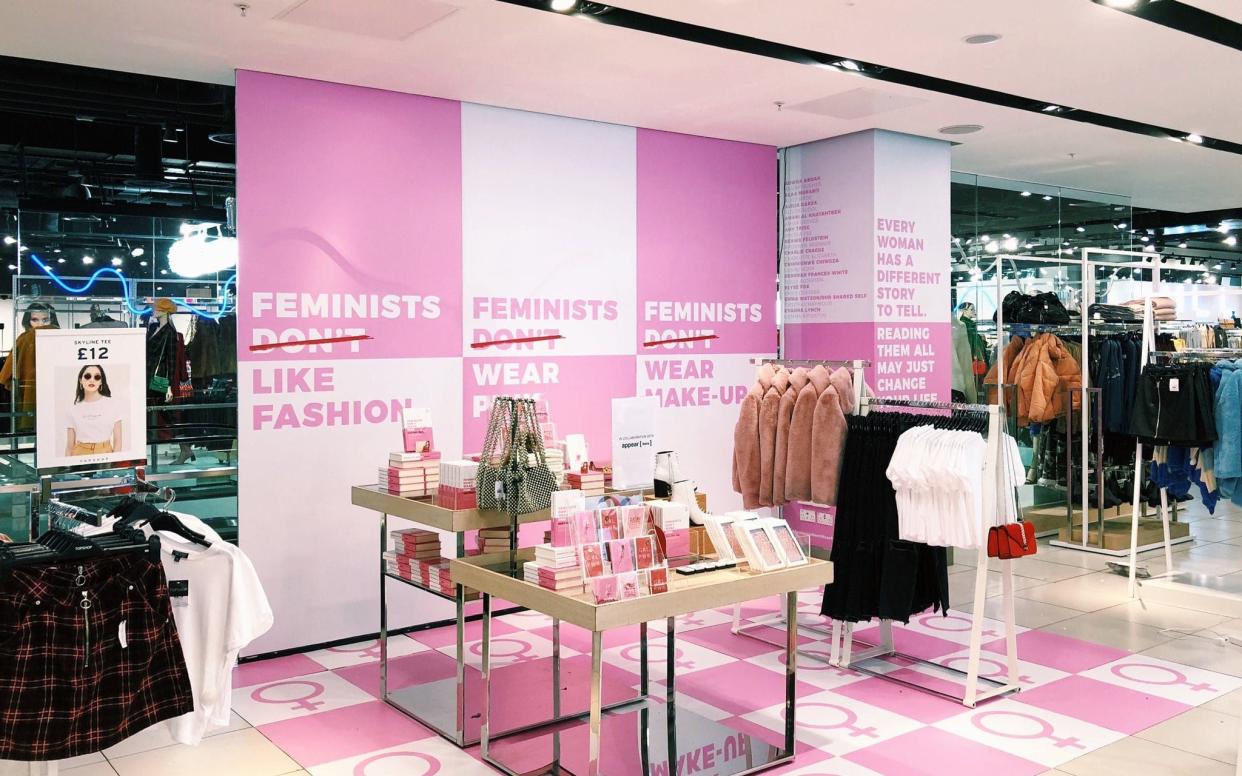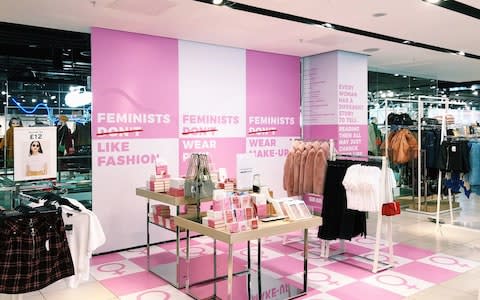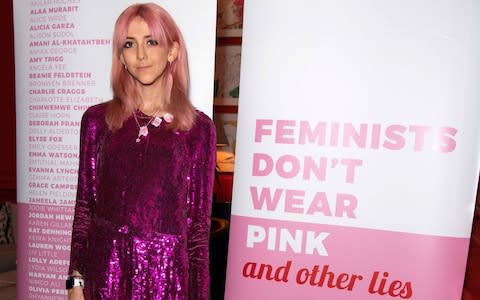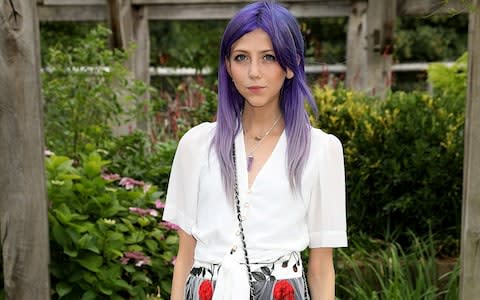Scarlett Curtis tells Bryony Gordon's Mad World Podcast: 'I felt like a shell of a human'

Writer and feminist activist Scarlett Curtis speaks to the Telegraph’s Bryony Gordon in a special edition of her podcast, Mad World, where she interviews guests about their mental health experiences.
Scarlett opens up about her struggles with PTSD following major surgery, and how her writing and work within the feminism field help her cope with her own mental health on a day-to-day basis. Podcast caution advised: contains strong language.
I live in a feminist bubble. It’s a lovely bubble to live in. It’s a bubble full of amazing activists and pink t-shirts and women who genuinely believe they can change the world. The only problem with the bubble is that sometimes, you forget there’s a world outside of it.
I was reminded of that last week when, while promoting my new book Feminists Don’t Wear Pink, we created a small pop-up shop in Topshop’s flagship London store that was supposed to run for the entire week of publication.
The book is a collection of essays by 52 incredible women on what the ‘f word’ means to them, and our installation was aimed at teenage girls: the idea being that we want them to see that the feminist movement might be something worth getting involved with. And Topshop seemed like the perfect place – one where I had spent my teenage weekends trawling the aisles, readily hoovering up their brand and messaging.
Yet two hours after we had ‘popped up,’ our stand was dismantled. Not by the shop’s staff, who were brilliant, and thoroughly supportive. But on the order of one man, who has spent his career making millions from the likes of me – and yet apparently thought that a book fighting for girls’ equality was too controversial.
All the royalties go to an amazing UN charity called Girl Up, whose mission is to bring an end FGM, get girls back into education and end child marriage in developing countries, and so our main fear when the pop-up was removed was that much-needed donations would be lost. Topshop remedied this almost immediately, donating £25,000 to the organisation in a gesture that is not to be ignored.

But there remains a lingering, more sinister fear that has not yet been quietened in my mind. Topshop as a brand, and Philip Green as a CEO have spent the last 54 years dressing the nation’s teenage girls – and those in more than 40 other countries, from the United States to Slovenia, Ireland and Lebanon. By taking down the pop up, the company is signalling it won’t endorse a movement that is very simply fighting for women and men to have equal rights. I find this sickening; a clear and chilling example of the patriarchy in action.
Women have been socialised from birth to accept sexism as a part of life. We’ve been told to be quieter, nicer, prettier, less angry and more appealing. In our book, the campaigner Nimco Ali says “it seems like things can only get worse, but let me tell you a secret: things are changing, and we are winning”. We are winning, yes, but we haven’t won yet. What happened at Topshop last week was a true example of the ways in which the patriarchy infects and dictates every inch of our society. It has to stop, we will make it stop, and this book is my attempt to make sure it does.
I never dreamt feminism would be my antidepressant. But I also never dreamt I would need one.
Up until the age of 14, I’d been a very normal teenage girl – one who thought sexual equality was something we’d already sorted out. I mean, we had Beyoncé, didn’t we?
Then, my life changed. Following a standard back operation for scoliosis (a twisted spine), I experienced a bout of chronic pain that endured for the next two and a half years. It was so severe I had to drop out of school, was barely able to walk and spent protracted periods in a wheelchair.

It was a confusing and unhappy time, made worse by repeated misdiagnoses. Some people might grow very angry and turn it all outwards, but for me, it was the reverse. I thought what had happened was my fault; that I’d ruined my family’s life.
If there ever was a recipe for messing up a teenage girl’s brain, this was undoubtedly it. I stopped believing the pain would ever go away, and couldn’t even imagine what life would be like without it.
Two years after my original surgery, the metalwork was removed from my spine. Waking up after the second operation, aged 17, I straight away felt something different: the pain had gone. My life could finally begin. During those years of agony, I had thought I would become the happiest, most incredible person in the world as soon as my body had healed – life, I was sure, was going to be amazing.
And at first, it was. But when I returned to school six months later to try and do my A Levels, my brief spell of joy came to an unwelcome end. For the next five months, I felt worse with every day that passed; worse, almost, than when I’d suffered the physical pain because I hated myself for what I’d become.
Then, the panic attacks started, and I couldn’t get out of bed. I dropped out of school again, and another two years went by before I was able to leave the house.

We eventually realised I had post-traumatic stress disorder, which was fuelling the depression and anxiety. The biggest difference between my physical and mental struggles was that when I was in pain, I could explain it to people. When I was crazy, I shut everyone out. There were two days when I felt so dreadful, I could well have ended it all.
After two years I decided to move to New York to try and distance myself from the last few years in London. My first year there was the darkest I’ve ever experienced. I thought I needed to be alone, but once there, I felt too alone. At that point, I thought I would never feel better.
Finally, I hit rock bottom; I felt like a shell of a human. But it was around this time that I started my first office job, at an organisation called Global Citizen, which works to end extreme poverty.
Being surrounded by people who wanted to make the world a better place was everything I needed, and after a year there, I spent a further two at an activism organisation called Project Everyone, before starting my own feminist activist collective, Pink Protest, 18 months ago.
I knew I needed to make a difference, however small.
I hadn’t had a purpose for so long and didn’t really believe I could have fun. But activism and feminism were the first things that made me feel happy since the age of 14; I was human again.
To this day I still struggle with bouts of depression and anxiety, and I still find having fun quite hard. But the power of feminism as a form of self-help cannot be overstated. For me, reading about feminism, talking to other feminists and activists and understanding it more has
helped me unpick so many of the issues at the heart of many of my mental health struggles.
Back in my darkest days, I never imagined I’d be able to do this. But, as I wrote in the book, feminists “turn weakness into strength and vulnerability into power... they take broken girls and find a way to make them feel whole again.”
I have spent far too much of my life believing that I don’t measure up to what a person should be. But now, I’ve decided that I won’t spend any more of it feeling like I’m not enough – and nor should anyone else.
Feminists Don't Wear Pink (and other lies): Amazing women on what the F-word means to them by Scarlett Curtis is published by Penguin Books Ltd (RRP £12.99). Buy yours now for £10.99 at books.telegraph.co.uk or call 0844 871 1514